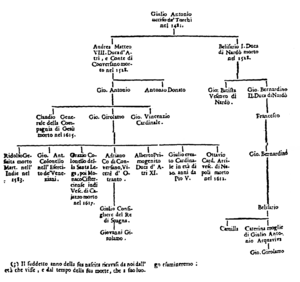Belisario Acquaviva

Acquaviva family tree
Belisario Acquaviva, Duca di Nardò (c. 1464 – 24 July 1528[1]) was an Italian nobleman and writer from the Kingdom of Naples. The younger brother of the literary figure Andrea Matteo Acquaviva, Belisario politically opposed his brother, being loyal to the Spaniards. Belisario was hence enabled not only to preserve his own patrimony, but to procure the restitution of his brother's. Like that brother, he applied himself to letters, and left several dissertations, collected since into one volume.[2]
Of this illustrious name were several other members attached to literature. Two dukes of Atri were poets.[2] Both his sons, Giacomo Antonio Acquaviva and Giovanni Battista Acquaviva, served as Bishop of Nardò.[3][4][5]
References
- ↑ Adelung, Johann Christoph. Allgemeines Gelehrten-Lexicon: Fortsetzung und Ergänzungen zu Christian Gottlieb Jöchers allgemeinem Gelehrten-Lexico, worin die Schriftsteller aller Stände nach ihren vornehmsten Lebensumständen und Schriften beschrieben werden [Bd. 3-6] von Heinrich Wilhelm Rotermund. [Bd. 7] von Otto Günther. - Leipzig [et al.]: Gleditsch [et al.], 1784-1897. - 7 Bde.
- 1 2 Rose, Hugh James (1857). A New General Biographical Dictionary, London: B. Fellowes et al.
- ↑ Fondazione Terra D'Otranto: "La “Spina” del vescovo" da Marcello Gaballo 06/06/2013
- ↑ "Father Giacomo Antonio Acquaviva" Catholic-Hierarchy.org. David M. Cheney. Retrieved February 29, 2016
- ↑ "Bishop Giovanni Battista Acquaviva" Catholic-Hierarchy.org. David M. Cheney. Retrieved February 29, 2016
This article is issued from Wikipedia - version of the 6/24/2016. The text is available under the Creative Commons Attribution/Share Alike but additional terms may apply for the media files.